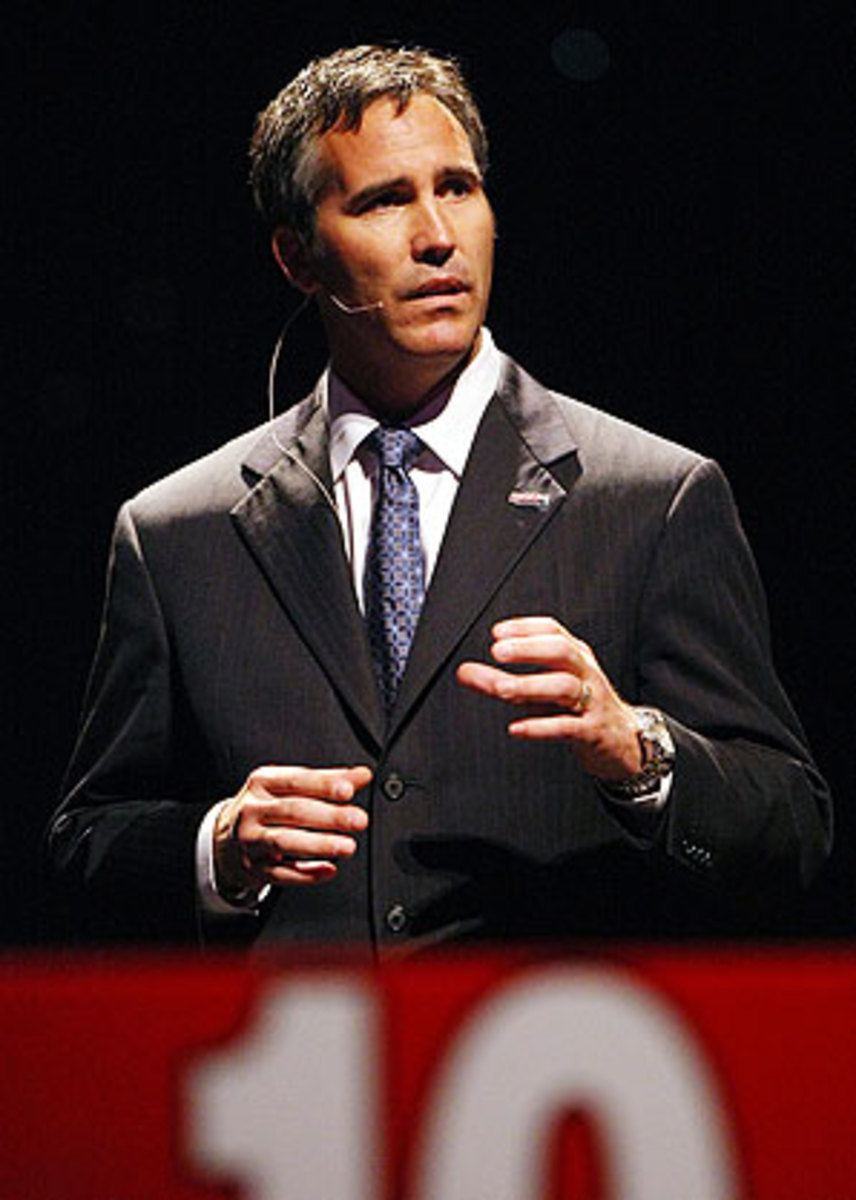Bernard hoping to see record-breaking speeds at Indy Centennial
LEEDS, Ala. -- Randy Bernard has said for months he wants the current Indianapolis Motor Speedway lap records "gone," and as quickly as possible, preferably during the track's Centennial Celebration of the May 29 Indianapolis 500.
Seventy-four days from the open wheel league's marquee event, the Izod IndyCar Series CEO awaits approval from speedway and network broadcast partner officials to stage an early May exhibition to break the 14-year-old record of 237.498 mph set by Arie Luyendyk.
"It's very doable if up to me. I'm pushing it big time," Bernard said on Monday at an open test at Barber Motorsports Park. "I think the traditionalist, the purist, anyone loves to hear about speed. You hear of records being broke, it'll be impactful. It's the century race. Only happens once every 100 years, let's make good things out of it."
It could perhaps have an impact on perception of the series and its greatest race during its most exploitable period of national curiosity. But as essentially a demonstration, it may not be embraced by teams at such a critical moment of the season. The cost of manufacturing new parts for a decommissioned engine formula largely made the venture unrealistic in competition.
Honda Performance Development, the series' sole engine-provider -- until Chevrolet and Lotus join next season -- has built and is ready to durability-test a 3.5-liter, methanol-burning engine capable of attaining record-breaking speeds. The company would then construct three more for use in two cars during the exhibition, said HPD technical director Roger Griffiths. The IndyCar series has an open test at the Kentucky Speedway oval on May 9.
IndyCar currently races a newer formula 3.5-liter engine on ethanol, which Griffiths said would be "a lot harder" to tweak into record-producing performance levels.
"We're going to wait for IndyCar to decide what they're going to do, because they haven't actually told us what they're going to do," he said. "When they tell us what they're going to do, we will build those four engines. I'm not going to build, effectively, a quarter of a million dollars worth of engines speculatively. I'm going to wait for Randy and (president of competition and racing operations) Brian Barnhart."
Penske Racing president Tim Cindric, who has in the past expressed an interest in seeing records broken at the Speedway, declined to comment until a decision is made. Speedway officials did not immediately respond.
There is a dilemma within the opportunity for any team involved. There would be history and publicity, but also the risk of injury to a driver weeks before the most important race of their season and careers, in a venture that would in no way benefit their race effort.
"One of the things everybody was getting nervous going into the 500 about was nobody's gone this fast before in this kind of car," Griffiths said of the eighth-year model, which will be replaced in 2012. "You don't really know how things are going to work out. If something goes wrong, someone's backing into the wall pretty hard. IndyCar has a seven-day concussion rule, meaning you can't get back in the car if you've suffered some kind of concussion for seven days. So everyone was extremely nervous about doing it before the start of the 500. You could put your number one driver out of action.
"These are all concerns that have been discussed. Everyone needs to be comfortable this is the right thing to do before we do it. We're up for it. We're racers, but we also have to be mindful of what we're trying to do, and any time you try to go faster than anybody has gone before, there's some associated risk. It's probably safer than going racing because it's one car on the track at a time, but whoever is behind the wheel is going to be on the ragged edge. That's why it's fun and exciting and why it's a record."
Luyendyk set the single- and four-lap average (236.986) qualifying records in 1996 in a Reynard/Ford Cosworth. Helio Castroneves, who won the Indy pole last year at 227.970 mph, was in 2003 the last to pierce the 230-mph boundary (231.725). That spec methanol-burning 3.5-liter engine has not been used at the Speedway since, and was last employed at Motegi in 2004, Griffiths said.






